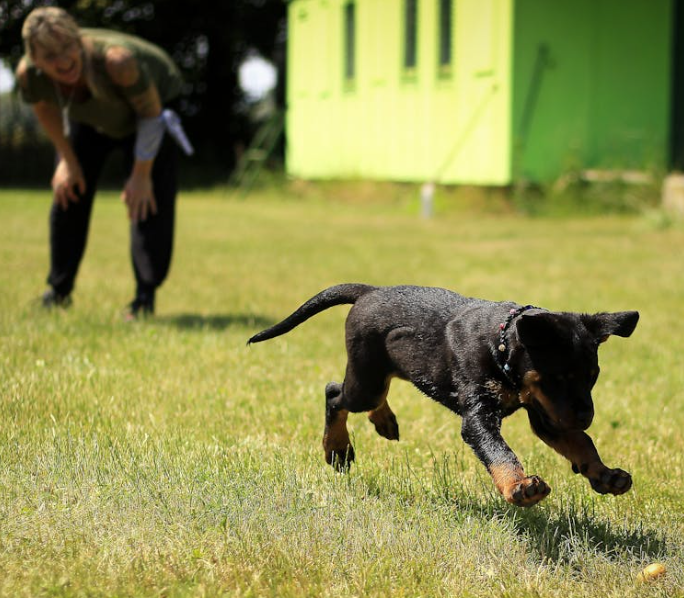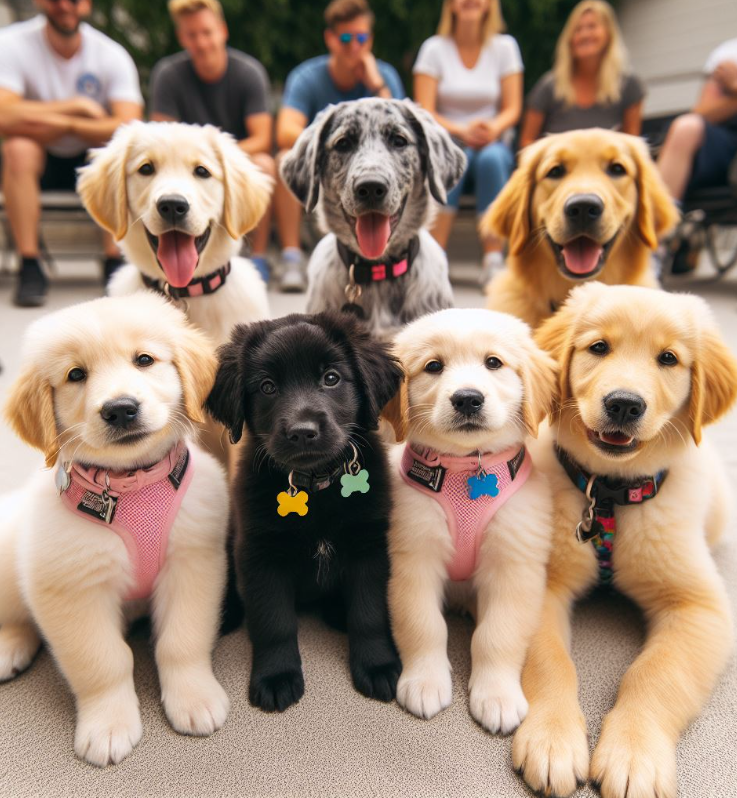
Do you remember the immense excitement that ran through you the first time when you welcomed a puppy? Your family is welcoming another member, who will bring love, joy...and many destroyed shoes, and pieces of furniture!
Most pups go through a “destructive” phase, leaving their owners almost hopeless...While some pet parents cross their fingers and hope for this life stage to pass quickly, others start considering a better way to deal with it, namely through proper training!
Once you decide to train your puppy, the next step comes! What training option would best suit your young paw friend’s needs? There are various types of puppy schools, puppy training camps, puppy trainers, obedience classes, etc. How do you make the right decision? Let’s find out together!

Defining Your Goals
It is important to clarify for yourself what your short-term and long-term goals are, so you can opt for the best program for your pup and be able to adapt it to their needs properly.
Short-Term Goals
Basic Obedience
If your puppy is still very young, your immediate goal might be to teach them basic obedience commands such as “sit”, “stay”, “come”, “leave”, and leash walking. Whether you have picked up your pup to train them as a service dog in the future or not, teaching them the fundamentals is always recommended.
Training will give them a sense of purpose and will help them become confident adult dogs, who are good society members.
Potty Training
If you collect your pup at a very young age (e.g. 8-10 weeks), they won’t have any sanitary habits yet. It takes time and the right approach to teach a pup where to go potty.
If you are a new pet owner and lack experience, consulting a trainer/school/training organization might be needed.
Furthermore, proper potty training may help your dog learn to go potty on cue, which can be very useful if you consider more advanced training at some point later.
Socialization
You may already be aware of the crucial role of early socialization in a dog’s life. It is critical for puppies to learn appropriate behavior around other animals, people with various appearances, and new environments. This will help avoid any unpleasant and potentially dangerous situations in the future.
Needless to say, possessing excellent social skills is fundamental for companion and/or service dog training.
Addressing Specific Behavioral Issues
Excessive barking, overexcitement, chewing, jumping on people and animals...there is a long list of unwanted behaviors that a pup can exhibit, and that’s pretty normal. Puppies are still exploring the world and how things work. They gradually understand what their boundaries are and what behaviors are acceptable and what- not.
This is a normal stage of development, which will gradually be outgrown, and many of these unwanted behaviors will phase out over time. However, it can go much smoother if proper training is conducted and these behaviors are addressed on time. This will help ensure that the root of the problem is identified and addressed promptly. It is always better to address an issue while it is still developing, instead of trying to correct a behavior after it has become a habit.
Preventing Unwanted Behaviors
Proactively working to prevent common behavior problems such as separation anxiety or fearfulness can be another short-term goal that you should consider.
Puppyhood is a life stage, related to getting to know each other and recognizing strengths and weaknesses. Having said that, it is important to try identifying potential weaknesses that may turn into potential behavioral issues in the future.
Long-Term Goals
Advanced Obedience
As your puppy matures, you might aim for more advanced obedience training, including off-leash commands, tricks, participation in dog sports like agility or obedience trials, or service dog training!
You will have already understood your pup in terms of personality and temperament. This will help you properly evaluate their potential for more advanced work. If you have already achieved your short-term goals, engaging in advanced obedience and adapting the process to your pup’s temperament, training background, and needs would be much easier.
Talking about your needs, let’s move to the next point!
Specialized Training
Depending on your interests and your puppy's abilities, you might pursue specialized training such as companion dog or service dog training, or even search and rescue training.
Specialized training requires dogs to know the fundamentals and have impeccable manners in environments with many distractions.
If you are considering making your paw friend your service dog, you might want to check the service dog programs we offer.
They are focused on different types of tasks, including mobility-related ones, environmental, psychiatric, and medical alert tasks. Some of these types are more specific and time-consuming than others, so make sure you have the patience and determination needed for training to succeed.
Behavioral Modification
In some cases, behavioral modification may be needed.
If your puppy has persistent behavior issues or develops new ones as they grow older, your long-term goal might be to address and modify these behaviors through continued training and behavior modification techniques.
Positive reinforcement, clicker training, desensitization, counter-conditioning, and training games can be valuable behavioral modification tools.
Building a Strong Bond
Ultimately, a long-term goal for any puppy training program is to strengthen the bond between you and your puppy, fostering mutual trust, respect, and communication.
The deeper your connection is, the more attuned the pup will be to you and the easier advanced training will be conducted.

Lifestyle Considerations When Setting Your Goals
Family Dynamics
Engulfed by excitement due to welcoming a pup, we may forget to consider all the other people who will also become part of the pup’s life. Even if you are the owner, your family’s lifestyle and dynamics will play a huge role in the pup’s life. They will also affect the process of setting your goals in terms of raising and training.
For example, if you have children or live in a multiple-pet household, you might want to emphasize your pup’s social skills and ability to interact safely with them (and vice versa).
Living Situation
Your living situation, whether you reside in an apartment, house with a yard, or rural area, can also influence your goals.
For instance, urban dwellers might prioritize leash manners and polite greetings in crowded environments, while rural residents may focus more on recall and off-leash training.
By considering these short-term, long-term, and lifestyle-oriented goals, you might find (and adjust) the best program for your puppy so that it meets both your needs and your puppy's developmental requirements.

Advantages and Disadvantages of Different Types of Puppy Training Programs
When choosing a training program to suit your pup’s needs the best, it is essential to consider various factors such as the puppy's temperament, and your schedule, budget, and training goals.
Puppy Schools- Pros
Structured Environment
Puppy schools offer a structured learning environment with a curriculum designed to address common behavior issues.
The organized nature of classes helps puppies understand routines, expectations, and boundaries while contributing to better learning outcomes.
Socialization Opportunities
If you opt for a puppy school for your beloved friend, you will give them a chance to interact with other dogs in a controlled environment, which is crucial for their social development.
Socialization at a young age is essential for a pup’s further development! It helps prevent behavioral problems such as fearfulness or aggression towards other dogs or people later in life.
Moreover, dogs tend to mimic behaviors that have proved beneficial for them, i.e. if a dog sees another one being rewarded for showing a specific behavior, there is a high likelihood for that dog to also show the same behavior. In other words, dogs pick up on other dogs’ social skills.
Expert Guidance
Classes are typically led by experienced trainers who can provide professional guidance and advice.
Trainers can offer insights into puppy behavior and effective training techniques, helping you better understand your paw friend.
Learning in an Environment Free of Distractions
Puppy schools often provide a controlled environment with minimal distractions, allowing puppies to focus on learning commands and behaviors.
Controlled distractions can gradually be introduced to help puppies learn to remain focused even in stimulating environments.
Puppy Schools- Cons
Fixed Schedule
Classes are held at specific times, which may not always align with your schedule or availability.
If you have a busy schedule, it can be challenging for you to regularly attend classes.
Limited Individual Attention
In a group setting, trainers may not be able to address each pup’s specific issues.
Puppies with special needs or behavioral challenges may require more personalized attention which might be challenging in a group class setting.
Variation in Training Quality
The effectiveness of puppy schools can vary depending on the qualifications and experience of the trainers.
Some schools may offer high-quality instruction, while others may provide less comprehensive training programs.
Overstimulation
While socialization is beneficial, some puppies may become overstimulated or overwhelmed in a group setting.
As a responsible owner, you should monitor your puppy's behavior closely and ensure that the environment is beneficial for their learning and overall well-being.

Puppy Training Camps- Pros
Intensive Training
Puppy training camps offer immersive and intensive training experiences for your puppy.
Puppies receive concentrated, one-on-one attention from professional trainers, which can accelerate the learning process.
Professional Supervision
You can rely on trainers to oversee the entire training process, ensuring consistency and effectiveness in training methods.
They can tailor the training program to address your puppy's specific needs and behavioral issues.
Time-Saving
Training camps typically offer structured programs that cover a wide range of behaviors and commands in a short period.
This can save time for busy owners who may not have the resources to dedicate extensive time to training on their own.
Socialization Opportunities
Depending on the camp's structure, puppies may have opportunities to interact with other dogs in a supervised environment.
As already mentioned, socialization with other dogs and people is crucial for a puppy's development and can help prevent behavioral issues in the future.
Puppy Training Camps- Cons
Separation from Owner
Some owners may feel anxious about leaving their puppy in a camp setting for an extended period.
Separation from the owner can cause stress and anxiety for some puppies, too, especially if they are not accustomed to being away from home.
Cost
Training camps can be expensive due to the personalized attention and intensive nature of the program.
The cost of enrollment, along with any additional fees for specialized training or accommodations, can be prohibitive for some owners.
Lack of Owner Involvement
While trainers work closely with the puppies during their time at the camp, owners may feel disconnected from the training process.
Some owners prefer to be actively involved in their puppy's training journey and may feel excluded by the camp's format.
Training Transfer
After completing a training camp, owners need to continue reinforcing the learned behaviors at home.
Without consistent reinforcement and follow-up training, puppies may struggle to maintain their training progress once they return home.

Puppy Trainers- Pros
Personalized Approach
Puppy dog trainers can tailor the training program to address specific behavior issues and training goals.
They assess your puppy's individual needs and create a customized training plan to help you achieve your training goals.
Convenience
Training sessions with a puppy trainer can be scheduled at a time and location that suits you
This flexibility accommodates busy schedules and allows for training sessions to take place in familiar environments, such as your home or a local park.
Continuity
Working with the same trainer allows consistency in the utilized training methods and progress tracking.
The trainer becomes familiar with your puppy's progress and can adjust the training plan as needed to ensure continued improvement.
Individual Attention
Private training sessions offer focused attention on your puppy, allowing the trainer to address specific behavioral issues effectively.
Your puppy receives personalized guidance and feedback, leading to more rapid progress in training.
Puppy Trainers- Cons
Cost
Private training sessions with a puppy trainer can be more expensive than other training options, especially if multiple sessions are required.
The cost may be prohibitive for some owners, particularly if budget is a concern.
Availability
Popular trainers, who have proved reliable, may have limited availability, leading to conflicts with scheduling.
It's essential to plan and schedule training sessions in advance to ensure you can work with your preferred trainer.
Reliance on Trainer
While working with a personal dog trainer can yield positive results, there is a risk of becoming overly reliant on the trainer for resolving behavioral issues.
Owners should actively participate in training sessions and continue reinforcing learned behaviors independently to maintain progress.

Puppy Obedience Class- Pros
Structured Learning
Puppy obedience classes provide a structured environment to help pups learn fundamental commands and behaviors.
Classes typically follow a curriculum designed to introduce and reinforce obedience skills progressively.
Group Dynamics
Puppies learn to behave around other dogs and people, improving their social skills and ability to navigate different environments.
Group classes offer opportunities for supervised socialization, which is essential for promoting positive behavior and reducing anxiety in busy environments.
Affordability
Obedience classes are often more affordable than private training sessions, making them accessible to a wider range of owners.
The lower cost makes it easier for owners to enroll their puppies in obedience classes without having concerns about their budget.
Professional Guidance
Similar to puppy schools, classes are also led by experienced trainers who can give pieces of advice and helpful feedback on training techniques.
Puppy Obedience Class- Cons
Limited Customization
Obedience classes may not be the best solution to address specific behavioral issues, as the curriculum is designed to accommodate a group of puppies.
If you are looking for a more individual approach to address your pup’s specific behavioral issues, an obedience class might not be the right fit for you.
Distractions
Your pup might get easily distracted by the other puppies in the class, which can affect their focus and learning progress.
Since puppies have a short attention span, your furry friend may struggle to concentrate on training exercises in the presence of other dogs, particularly if they are easily distracted or excitable.
Fixed Schedule
Similar to puppy schools, classes take place at a specific time, which can make it challenging for you to incorporate them into your busy schedule.
When choosing between the different training options, take your puppy's individual needs as well as your training goals into account. Set a budget, consider the pros and cons of each option and make an informed decision. This will help ensure that you are doing what’s best for your furry family member!










